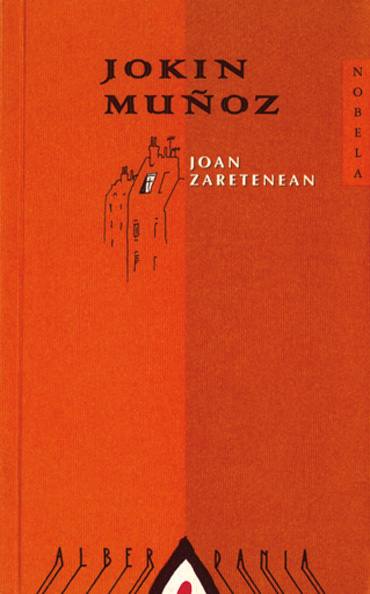
Release From Your Father’s House
- Jokin Muñoz::When you left Alberdania, 1997 :: 168 pages Price: $11.80
Aritz Galarraga
2011ko martxoaren 22a

There's a Jokin Muñoz before Life sleeps. Forgotten, forgotten, unknown I don’t know, but there is, and legible, of course. It could have been the premiere, the narrative work Fractures, from 1995. It could have been the book of travel biajia to Atlantis (how to define this exciting purrustada? ). The flesh, however, is weak, and I have chosen it when you are John, the novel of course, the king of the genre, with a little prediction, and when there are things, it will be the only genre that will last in the future, perhaps including the others, the Creole novel. Or, wait, wasn't the novel dying? It doesn’t matter, Ángel Epaltza told us that in Muñoz this is great. Let's take a look at it.
The story is based on three characters: Álvaro, first of all, because he is the narrator, because he addresses Helena, the girl who was a friend. We have Helena, in fact, in the second place, and the triangle is formed by Mikel, a friend of Álvaro’s youth. Helena is already gone, Mikel will fall into Álvaro’s mantle in the Impene, like another piece of the car that he has just planted, violently bragging about the remains of the past. Mikel is the heir to a worldview that has overestimated sustainability and loyalty for centuries. Son of an immense weakness and extinction that best match the times of Álvaro. But both, Helena, are nothing more than petty heirs condemned to defend and perpetuate the house erected by their predecessors.
And, yes, the presence of the Basque conflict is constant and disturbing here too, adorned with the harsh, beating, so to speak, images that Muñoz is accustomed to, such as the image of those exploded bodies of children thrown on the sidewalk. Yes, Viva is a heavy, rigid, repetitive style of that dream, also from here, obsessive, very broad, directed to Helena in a restless monologue Álvaro confused. Yes, we also have here the constants that are found in the literary trajectory of Muñoz, the craving for escape, the need for distance, individual rebellion. Yes, realism is also here, if psychological, existentialist realism is preferred.
But, brilliantly, he captures a generation, makes a ruthless and uncomfortable portrait of it, exhorts it to free it from its father’s house, exercises to relieve the burden that previous generations cause, and he does it with the mentioned tools, he does it well, whether he agrees or not, he does something to make it move in the reader’s pockets. So there's a Jokin Muñoz before Life sleeps that curiously looks a lot like Jokin Muñoz.
The story is based on three characters: Álvaro, first of all, because he is the narrator, because he addresses Helena, the girl who was a friend. We have Helena, in fact, in the second place, and the triangle is formed by Mikel, a friend of Álvaro’s youth. Helena is already gone, Mikel will fall into Álvaro’s mantle in the Impene, like another piece of the car that he has just planted, violently bragging about the remains of the past. Mikel is the heir to a worldview that has overestimated sustainability and loyalty for centuries. Son of an immense weakness and extinction that best match the times of Álvaro. But both, Helena, are nothing more than petty heirs condemned to defend and perpetuate the house erected by their predecessors.
And, yes, the presence of the Basque conflict is constant and disturbing here too, adorned with the harsh, beating, so to speak, images that Muñoz is accustomed to, such as the image of those exploded bodies of children thrown on the sidewalk. Yes, Viva is a heavy, rigid, repetitive style of that dream, also from here, obsessive, very broad, directed to Helena in a restless monologue Álvaro confused. Yes, we also have here the constants that are found in the literary trajectory of Muñoz, the craving for escape, the need for distance, individual rebellion. Yes, realism is also here, if psychological, existentialist realism is preferred.
But, brilliantly, he captures a generation, makes a ruthless and uncomfortable portrait of it, exhorts it to free it from its father’s house, exercises to relieve the burden that previous generations cause, and he does it with the mentioned tools, he does it well, whether he agrees or not, he does something to make it move in the reader’s pockets. So there's a Jokin Muñoz before Life sleeps that curiously looks a lot like Jokin Muñoz.